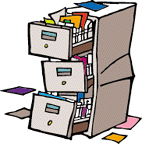

Netiquette is etiquette (rules of polite conduct and behavior) for the Internet. The net includes e-mail, the World Wide Web, bulletin boards, and news groups.
Check your e-mail on a regular basis.
You should try to check your e-mail on a regular basis, especially if you are in an online class. You never know when a professor may post a new assignment.
Type a subject in the subject line.

The subject line provides a chance for you to give a brief one to five word description of what your message is about, as well as giving you a description of what incoming messages concern. Without something written in the subject line, messages may be overlooked or deemed unimportant because the reader won't have a clue what the messages are about.
Sign your posts.

Please "sign" your posts, with either just your name and e-mail address, or a full signature block. This will help the reader of a message to know whom s/he is talking, incase s/he wishes to reply privately. Since some ISPs don't show the "From:" header when they display an email message, it helps to have your address in the message--especially if the reader is using a listerv (in which case the "Sender:" line would only show the mailing listserv address).
 What
is a flame? Flaming?
What
is a flame? Flaming?
A flame is name-calling, deriding, belittling, degrading, or insulting someone else's opinions, beliefs, or honest questions. It's an antagonistic criticism. Flaming, in any form, is generally not tolerated on the Internet (e-mail, WWW, bulletin boards, etc). Do not respond in kind to a flame. Such messages just add to the problem. A polite response is always permissible.
E-mail privacy.
Be professional and careful of what you say about others, as e-mail is easily forwarded. It is, however, considered rude to forward personal e-mail to mailing lists (listservs) or to other people in general without the author's permission.
Organize your e-mail files (saved message
folders).
Organize your e-mail by saving your messages into different folders based upon the subject matter of the message. This will make it easier to find a particular message that you are looking for, rather than a time-consuming message-by-message search. |
 |
 |
Check spelling, grammar, and punctuation.Correct spelling and punctuation will make your message more professional and easier to read. |
No yelling.

Do not type in all capital letters. In e-mail, this is considered YELLING at someone. Plus, it is a little hard to read when looking at several lines of text in all capitals. Remember to turn off your "caps lock" key. Capitalize words only to highlight an important point or to distinguish a title or heading. *Asterisks* surrounding a word also can be used to make a point, or stronger.
 Wording and
emoticons.
Wording and
emoticons.
Be careful how you phrase things because humor and sarcasm that would normally be viewed in face-to-face communications come across as criticism in writing. To help avoid this problem, many people use emoticons (also known as emotes or smileys). A few examples of emoticons:
For happy, funny, grin, or wink: <G> and :) or ;) For something sad: :(
No Smart Quotes
Many ISPs can not handle smart quotes. If your word processing program uses them, please turn them off, Otherwise, a message of "You're here?" will appear as: =92$=You=$re here?$=92=20. In fact, this also includes things like accent marks on words like cliche and resume. No curly quotes, no curly apostrophes, no "n's" with tildes on them, no "e's" with accents. Spell them Senor and cliche. Also, when you type an ellipses, type out the three dots; don't use the special character. In other words, if it is not an actual key on your keyboard, it should not be used.
General E-mail Hints:

Hints for listservs:
Common Abbreviations:
| Abbreviation
(can be in all capital letters, all lower case letters, or a combination of both) |
Definition |
| BRB | be right back |
| BBS | be back soon |
| BTW | by the way |
| FYI | for your information |
| FWIW | for what it's worth |
| IIRC | if I recall correctly |
| IMHO | in my honest/humble opinion |
| LOL | laughing out loud (also: 'ROTFLOL', meaning 'rolling on the floor laughing out loud') |
| newbie | a person that is new to e-mail, a listserv, IRC, or the Internet in general |
| OTOH | on the other hand |
| POV | point of view |
| PPL | people |
| RL | real life (commonly seen as 'IRL,' meaning 'in real life, not online') |
A little humor:
